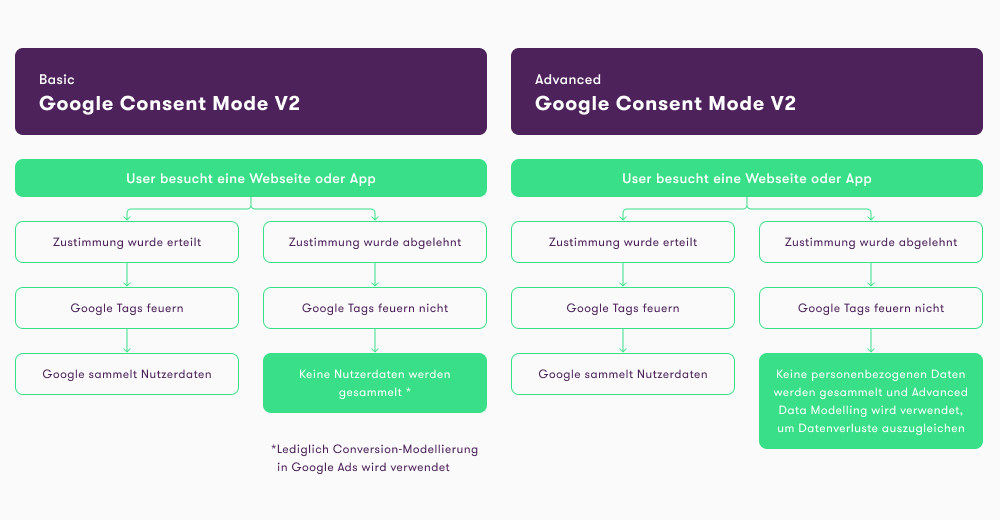As of 31 July 2024, Google Consent Mode V2 will also be mandatory in Switzerland. This new regulation affects all companies that operate online marketing measures in which they use Google Ads, create target groups for marketing purposes with Google Analytics data or share conversions with Google Ads. However, Advanced Google Consent Mode V2 makes it possible to send anonymous, cookie-free pings to Google for modelling purposes, despite the user's lack of consent to the use of cookies. This mode offers numerous advantages for marketers in particular, which we explain in detail below.
Is your company affected by Google Consent Mode V2?
With the introduction of Google Consent Mode V2 in Switzerland, companies must ensure that their websites comply with the new requirements. This applies to all companies that use user data for personalised advertising in Google Ads and carry out tracking with Google Analytics. This includes in particular the use of:
-
Data for personalised and targeted advertising
-
Google Ads Tags
-
Google Analytics Tags
-
Google Floodlights Tags
-
Conversion Linker
-
Apps that are provided with Firebase (SDK)
-
Analysis functions such as conversion tracking for websites and apps
-
Personalisation functions for targeting specific target groups
For more information on the development and further background information on Google Consent Mode and its implementation, please see our blog post on the new Google Consent Mode and everything you need to know about it.
Basic vs. Advanced Google Consent Mode V2
The newly introduced Google Consent Mode V2 comes in two different modes. It is important for companies to understand how these two modes vary in their functionality and implementation in order to make the right choice for their website.
Differences in functionality and implementation:
-
Basic Google Consent Mode V2: In this mode, Google tags are blocked by default until the user gives their consent via the Consent Management Tool on the website.
-
Advanced Google Consent Mode V2: This mode allows website operators to collect more information from users who have not consented by setting certain behaviours for tags and cookies based on the user's consent status.
"Advanced Mode" means tracking even if consent is refused, but without cookies and without any personal data.
The following graphic illustrates the differences between these two modes

Advanced Google Consent Mode V2 explained in more detail
Advanced Google Consent Mode V2 enables companies to collect data even if users have not given their consent or have only given incomplete consent. Aggregated and anonymised user data is collected and modelled using non-personally identifiable pings without cookies. Google AI is used to determine the impact of marketing measures, even if some of the conversions cannot be attributed to ad interactions. This modelled conversion data, which would have been lost without consent, can be fed back into the advertising systems. This allows advertisers to get a representative picture of performance, campaigns and bids can be significantly better optimised and more accurate, privacy-friendly measurements can be made.
"Consent Mode allows an average of around 65% of conversions to be tracked that would otherwise not have been recorded due to cookie consent."
Internal data from Google, 2023
How does conversion modelling work?
Conversion modelling is based on a series of aggregated, non-personally identifiable signals, such as device type, conversion type, country, time and browser type. The following steps take place during conversion modelling:
- If a user does not give consent, the Basic Google Consent Mode V2 ensures that no cookies are collected by Google tags for advertising or analysis purposes.
- The conversion modelling of Advanced Google Consent Mode V2 uses Google AI to determine the ratio between users who have given their consent and those who have not.
- Based on the observable conversion paths of people who have given their consent, attribution paths are created for those who have not given their consent.
- The estimated conversions are included directly in the Google Ads campaign reports and used for bidding and optimisation.
The benefits of Advanced Google Consent Mode V2 for marketers
By optimising data collection despite the lack of consent and a holistic conversion analysis, Advanced Google Consent Mode V2 offers numerous advantages for marketers and enables a more precise measurement of advertising effectiveness while taking data protection into account
-
Optimising data collection despite a lack of consent: Advanced Google Consent Mode V2 allows estimated conversions to be recorded even if users have not consented to the use of cookies. This ensures that marketers can continue to access a continuous database to optimise their marketing strategies.
-
Overall conversion analysis: Advertisers receive more precise information on the effectiveness of their advertising (ROI) and a comprehensive overview of the cross-device and cross-channel conversion path resulting from the ad interactions
-
Accurate measurement with data protection in mind: Data that cannot be used to identify individual users is used for estimated conversions. The number of conversions that cannot be recorded directly by Google is determined on this basis.
Conclusion and outlook
The Advanced Google Consent Mode V2 ensures that companies can continue to use relevant data for their marketing strategies even under stricter data protection regulations without jeopardising the privacy of users. Especially in Switzerland, where these regulations will come into force at the end of July 2024, it is essential for companies to prepare for this at an early stage and make the necessary adjustments. By implementing Advanced Google Consent Mode V2, companies can successfully master the balance between data protection and effective data analysis.
If you need support with the implementation of Advanced Google Consent Mode V2, feel free to contact us. We at Arcmedia are at your side with our expertise.








